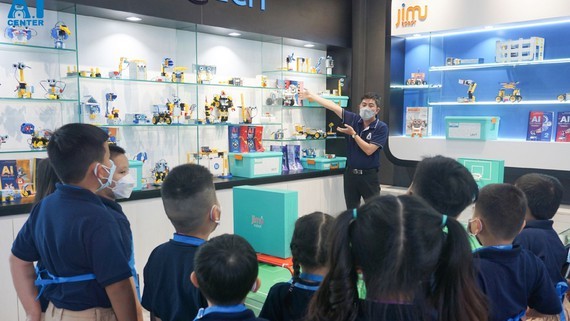
Vietnam needed around 1 million IT engineers in 2020, as cited in the project ‘Turning Vietnam into an ICT Giant’, approved by the Prime Minister in 2010. Sadly, the whole country now has only 177,000 undergraduates in the fields of IT, electronics, telecoms learning in over 400 universities and colleges. There will only be about 600,000 IT laborers, let along specialized AI employees.
Dean of the IT Department in University of Science (Vietnam National University – HCMC) Dinh Ba Tien stated that the training of AI human resources for the digital economy must ensure both quantity and quality, which means a provision of in-depth knowledge for graduates to become AI solution developers in the future, not merely AI solution users.
Until now, this university has poured over VND80 billion (US$3.48 million) of investment in specialized AI labs so that their graduates become true researchers, developers, and startups of AI-related smart systems. In a long term, the university hopes to professionally upgrade the teaching staff, including hiring newly AI graduates from abroad to participate in in-depth AI research as well as conducting academic exchanges with famous international AI research centers.
VNU-HCMC has lately asked to the Minister of Education and Training to allow it to cooperate with other key universities in adopting the project ‘Training Digital Human Resources for Digital Transformation, Digital Economy, and Digital Society’, aiming at doubling the number of high-quality IT engineers to 10,000 in the next 5 years.
Assoc. Prof. Dr. Vu Hai Quan, Director of VNU-HCMC, proposed the strategy ‘Expanding the Training Capacity of Scientific-Technological Human Resources to Approach AI via Additional and Long-term Education Investment’. This strategy has three main parts of establishing a three-partner relationship among educational institutes – the government – employers; upgrading AI knowledge to the current scientific human resources through shared learning resources and clubs; developing AI curricula from primary to territory levels.
The role of the Government in this strategy is to introduce a legal corridor and corresponding policies as well as providing state budget. Educational institutes are responsible for improving existing training programs by integrating online learning, hiring capable teachers, building more classrooms and workshops to expand the training scale. Businesses are in charge of supporting universities with infrastructure construction for research activities, scholarships, practical project participation.
President of Thaco Board of Director Tran Ba Duong shared that as an enterprise, he is highly aware of the influences of Industry 4.0. We can only win the race with a strong foundation. Being one key factor, the AI human resources trained by universities must be able to integrate their digital skills, professional knowledge, and administrative expertise. Therefore, educational institutes must change their training curricula so that their graduates can fulfill digital transformation tasks.
President of My Lan JSC. Board of Director Nguyen Thanh My added that technological businesses always want to work with universities to address human resources shortage and limits in tools for basic research. This partnership is expected to create more novel products and technologies, plus easily commercializing research results. Thus, related state agencies and ministries should remove any barriers caused by outdated policies and tackle problems related to intellectual property, the rights to use results of joint projects between a business and a university.
Many technological businesses commented that right now, it is necessary to hire foreign AI experts for the digital transformation process. However, to master advanced technologies in a long term, domestic training centers should cooperate with one another to be more proactive in human resources.
Assoc. Prof. Dr. Vu Hai Quan informed that the digital economy is assigned to contribute 25 percent and 40 percent to HCMC’s GRDP in 2025 and 2030, respectively. VNU-HCMC, in turn, is asked to train the ICT and AI human resources that can match international standards in order to fulfill the above goals. At present, the IT and AI major group of the university has 2,000 students, along with another 2,000 in computer-related majors like math, telecoms, automation. It plans to increase enrollment in these majors in the next 5 years.
He further stated that AI is the core technology in establishing innovative and smart urban areas as well as sustainable digital economic growth, as cited in the program ‘Researching and Developing AI Applications in HCMC from 2020-2030, with a Vision to 2030’. This means the AI industry and IT industry in general will become the main element in GRDP growth of HCMC, and the city will become the national and regional center for AI technology research and transfer.
























